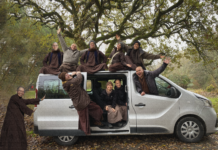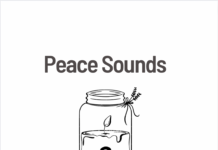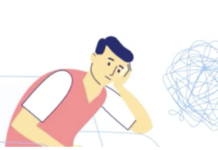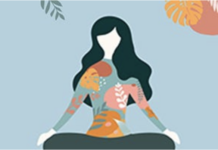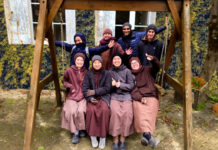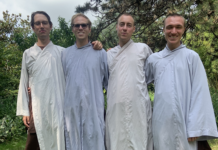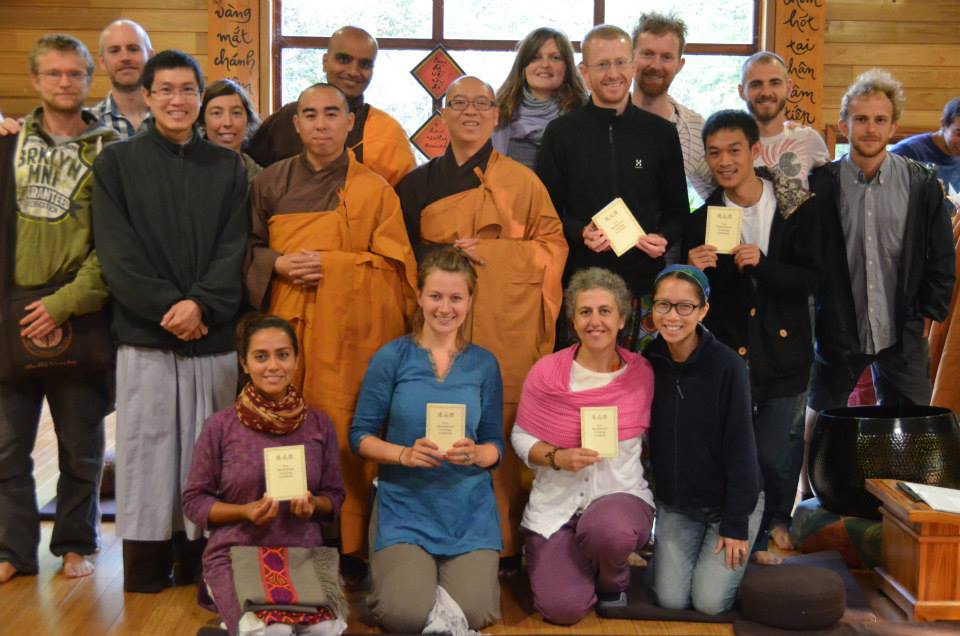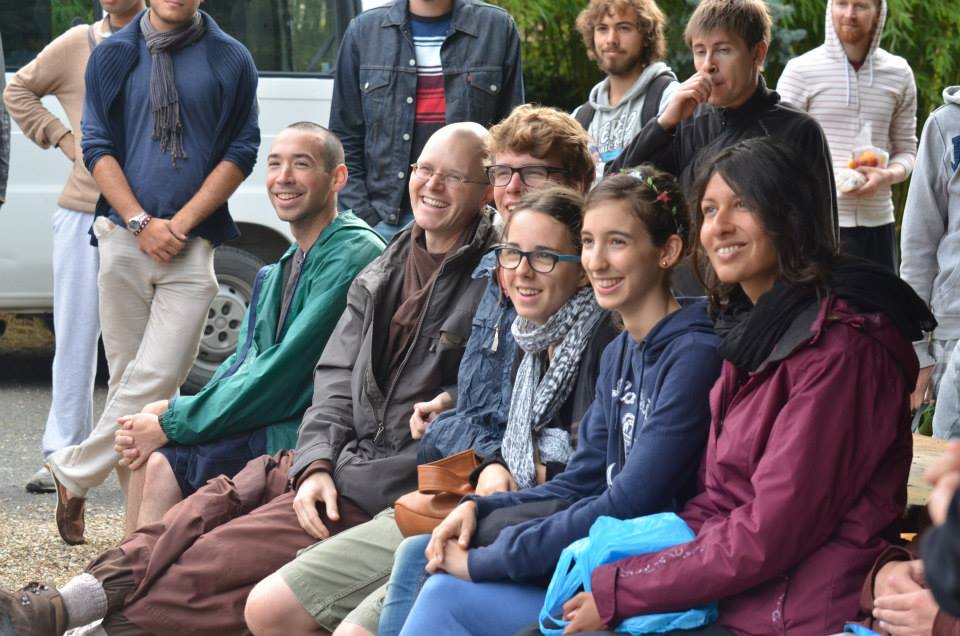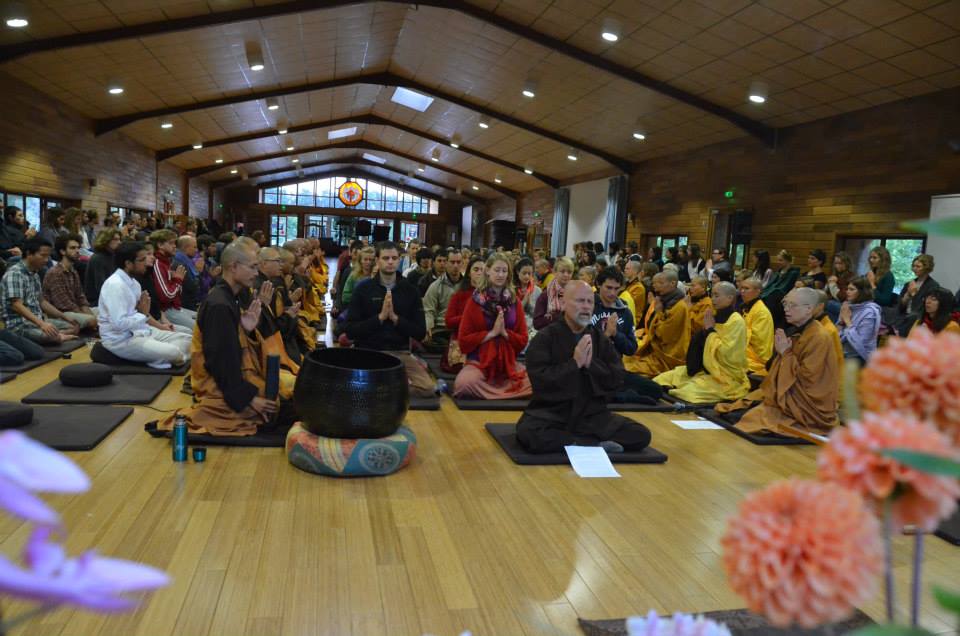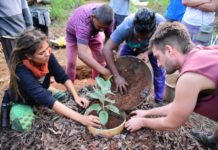During the International Wake Up Retreat in Plum Village in August 2013 – PART I
Sister Ban Bien Tap (BBT): Please introduce yourselves and how you started a Wake Up sangha in your country.
Brian: I’m from Germany. I grew up in Hamburg and I came in contact with this tradition and Wake Up in June, not so long ago.
On the last day after the 5 Mindfulness Trainings ceremony, Thay gave the last Dharma talk. At the end, it was very impressive what he said about the importance of a sangha in order to keep our practice going.
So I had in my mind to find a sangha or set up one. When I came back, I built it up. I found a few people, and we meet up once a week. It has really been inspiring for me.
Katharina: I’m 31 years old. I live in Berlin. A friend of mine who came to Plum Village (PV) for many years introduced me to the practice. So I saw Thay and the monastics in Berlin the first time in 2007.
Since then, I try to come regularly to the retreats and I also knew the importance of having sangha, but I never had enough energy to create one. But last year, I came to the 21-day retreat and had a consultation with a Dharma teacher.
I was sharing some difficulties, and at one point he said that I should focus on having a sangha. He supported me like a very kind grandfather and said that I would be able to do it. He was very warm and encouraged me to try.
Together with another friend, we started a Wake Up sangha in Berlin a year ago. I feel it’s very good to be committed to it and feel responsible for it in a way. Because then it is much harder to say, “I don’t have the time for it today.” I just have to be there – because it’s in my living room. It’s a good way to not lose the connection to the practice.
Leni: I’m from Belgium, close to Brussels. I rebuilt Wake Up Belgium with a friend of mine, Thomas, who also spent about a year in PV. We started three years ago.
I think it’s very nice to organize it together with other people. I’m not alone. There are other Wake Up people who are supporting and helping this. We share the responsibilities.
We still have a small Wake Up sangha in Belgium. We meet once a month. In this retreat I also feel the importance, or the necessity to come together and continue the Wake Up sangha in Belgium. I feel I have renewed energy to organise.
Annika: I was born in Germany, but I live Ireland in Dublin since 2007. I have been practicing on and off Thay’s tradition since 2006, but I only joined the sangha after Thay led the retreat in Ireland in 2012 during Easter.
There was a special Wake Up retreat for younger people and from there, people came together and talked about the possibility of starting a group together in Dublin. Of course there were more people who said that they were interested at this meeting than actually show up. But at the first meeting, 16 people showed up and we have been able to grow a sangha from that, keep it going, and meet every week.
First we met in people’s houses, then we got a room thanks to Mary O’Callaghan at the Oscailt Centre. We kind of graduated from being a smaller sibling of the grown up sangha, as we lovingly called them, the Open Heart sangha that Mary is a part of as well, who gave us lots of support and advice, not just the room. And they would like to see us to start.
It’s like growing up, that first we got everything for free and we were just taking, taking, taking. Now we are, for example, paying rent for the room and I am trying to help Mary with promoting stuff for Mindfulness Ireland. We are not just taking things for granted, but asking for donation to pay rent for the room. And we’re not just seeking energy from them, but sustaining our own activities.
We’ve organised two residential Wake Up retreats in Ireland. One in October in 2012, just a few months after we founded the sangha. We did everything like renting a whole youth hostel, setting everything up, finding people to organise the cooking, sitting with farmers buying food, negotiating transport, getting people transported from Dublin to Newgrange.
Looking back, I think we were just so inspired. We’ve had no idea it was such a big thing. So we were just so … ignorant, you know (laughs). It was a lovely retreat. There were so many people who came and tried mindfulness for the first time.
The retreat was kind of booked up in four days, and there were like more than four times of people that we could fit into the retreat on the waiting list. So every time that I felt reaching out a little bit, then there were many people coming back saying we want another one.
It’s really, wow, so impressive and you don’t know where they all come from. But at the same time, we are still a small group. And for me, it is important to keep the sangha going and I am not so focused on big publicity, printing T-shirts and having letterheads.
It’s really important to have a strong bond and support for yourself and others and the practice. And that we pretty much function like a regular sangha, have a 2-hour meeting every week and focus on the practice. There are two of us facilitate and we take turn. Though the retreats are what attract people the most and what they are hungry for. That’s what we are trying to offer to people, together with the monastics.
For me, the most important part of a sangha is to really support me and give me a lovely circle of friends who share the same values, support me and sometimes do things that are not normal in the environment that I live in mainstream society or in my job, people would act very differently and I think it’s so important to have that support.
Sometimes I wonder how it took me so long to get that. That would be so much easier if you join others, maybe because I’m not so much a club person but I’m so grateful for the Wake Up sangha.
BBT: What really kind of attract my attention is that in the West, there are so many options. Where I come from, there are no less than 30 meditation groups. So why PV and not other traditions?
Brian: I’ve been practicing different traditions for three years or so. I always had great difficulties in implementing the traditions into my life and putting them into action. I could always talk about them and have theoretical debates, but they didn’t help me to help myself and to help others.
When I came to the EIAB in June for a one-week retreat, the practice gave me a total change and the tools to bring the practice of spirituality into my life. Not by saying what is right or wrong but just doing it, by living each step, enjoying lunch at university and it helps me avoid conflicts with other people.
Most young people have different lifestyles with mainstream lifestyles, totally different lifestyles. If you are attached to your practice, in my experience, then you are in conflict with your friends and with your environment. PV tradition gave me the chance to avoid those conflicts by just living it.
I like to see how everything flows, if you’re just aware, and how the sangha in my town grows. For eight or nine weeks from the last retreat until now, I didn’t have any conflict with anybody about anything. Around me, people are happier and it’s nice to see this.
BBT: Really well done. Good practitioner!
Leni: I also tried some other traditions first like Vipassana retreats and Soto Zen, Japanese Zen. I’m actually still active in the Soto Zen group in my town. I have many sanghas.
But what attracts me in this tradition is the loving way in which Thay teaches us, how he speaks in Dharma talks, and the loving atmosphere in retreats and also in the sangha.
We also have an adult sangha of this tradition in my town and the Wake Up sangha in Belgium. It has a very nice energy. And I also think the Dharma sharing that we do when we get there and also in retreats is very precious.
In some traditions, there is no talking. When you go to a retreat for seven days, maybe one day out of seven you can talk a little bit, but on other days you are silent. In the tradition, talking is very important. We don’t have to be silent all day.
I think it’s very precious that we can share from the heart with each other and get to know each other on a deeper level. And that’s what attracts me a lot; that’s why I keep coming back here (laughs).
I also think young people yearn for that kind of contact, that kind of connection with each other, to be able to express ourselves in a deeper way and to listen to each other, to listen to our suffering. In this tradition, there’s a space created and it’s a very safe space. Not so easy to find in our society that kind of space. So I’m very grateful for that and that this tradition is here and that we have the sanghas in Europe.
And one more thing. I also think the joy in this tradition is so nice, that we can sing together, we make music together, very nourishing for me and I think for many young people.
Annika: I just want to add what my friend has just said. I think the Dharma sharing and this tradition is special.
I think there’s an opportunity for me to develop my empathy because sometimes I went to Vipassana retreats, and you sit there. Your hips hurt and you’ve been sitting for hours and everybody else sits like a Buddha.
It’s so easy to reject them, feel, compare, and think that you are worse than other people. It doesn’t help develop empathy or compassion because you are just rejecting and rejecting and rejecting.
I think when people share all their vulnerabilities and their joy from a deep and honest place, it’s a privilege that we don’t have a lot in the way we live. No matter how you idealise someone before, you just notice that everybody is going through tough struggles and it helps me feel so connected with people.
It’s easy to take a while one to understand them, and for me it’s also to receive that kind of empathy, which allows me little by little, to come as I am, accept myself and be myself even in and environment like my work.
Even if people don’t live according to the same guideline and not in a aggressive way or trying to convince them but just from the rootedness in the love of a group who has seen you as most honest and doesn’t reject you but support you.
That is very healing and is such a precious thing. The other thing is the joy and also the inclusiveness. I was so touched when Thay went to Ireland, which is a country with a strong Catholic tradition, but also a lot of hurt around that and a lot of abused faith.
But even when you are fighting with your parents, they are still your parents. You still have your roots and Thay encourages people to look deeply, keep whatever is valuable of their own spiritual tradition and put the rest in the compost and let the lotus grow from that, from all the pain and suffering. But he never tried to take advantage of the hurt of the people, convert them or say you should be Buddhist, look at all what the Catholic do. He never took that stand.
There are a lot of people in my sangha who still identify as Catholics. I have a friend from Israel who would probably sees herself as a Jewish. I have Muslim friends who come to the sangha with me. And it’s easy to talk about tolerance and many traditions do that, but I think the way it’s lived here, it’s really special.
And for me, it is like an invitation to whenever we get hurt we tend to construct and make up a sense of self and everything smaller. In spite of that we try to open up, open up and open up and there’s always a little bit more that you could do it and I think that it’s also a vulnerable thing and wonderful thing. I think that also something about Thay that touched me so much and it made it possible for me, in spite of my own hurt around ideology and people abusing power.
For me it’s more like coming from the East of Germany, having no religion but about ideology. But it’s the same thing. In spite of that, to trust in someone and to join a group because I feel that he/she is really respectful and compassionate. Thank you.
Katharina: A lot of things my friends have already touched, so I support what everyone has said. One thing I also very appreciate here is that I feel this tradition is behaving like an organism.
It doesn’t stop to develop. It tries to meet people’s suffering and the suffering of the society where it is today, not 50 or 100 or 200 years ago. So I feel that Thay is really a modern person. He tries to see what’s going on in the world. He talks about Barack Obama, things that are going on in the world, and he revised the Five Mindfulness Trainings. I’m so grateful for this idea.
Not only the “wise” people sat around the table to revise it, but the sangha tried to discuss it with the big community. I feel that it’s very wonderful; it’s interbeing in action. I think the modern aspect of this community attracts and touches many people.
BBT: In a busy life like it already is, do you find building sangha makes it even busier for you?
Katharina: For me, it’s a little bit similar to go to do sport. For example, if I have a training appointment for sport. Before, I feel like, “Oh, no I’m too tired. I would prefer sleeping,” or “The weather is so nice.” Maybe I want to go out, but then if I go afterwards I feel so much better.
It’s a little bit the same with the sangha. Sometimes I say, “Oh I have to work. Maybe I don’t have enough time.” But after the meeting, I feel it was the perfect thing to do. So I get rewarded five times more. In the end, I’m the lucky one.
I don’t need to do much. I just need to open my door because I do it at my place and make tea, and very nice people come to my home. In a city like Berlin, it’s not very easy to meet new friends who are interested in the same things. So I just open my door and very nice people come to my home. I don’t have to do much. I make tea and provide the energy. I don’t feel like I am investing a lot. Just the space.
Annika: I was kind of amused by this metaphor, and it makes sense to me the first metaphor that came to my mind. That my relationship to the sangha is a little bit like a love relationship. When I first met the sangha, I was so in love.
There was so much energy and I was just skipping around on the clouds. It’s like the energy just creating itself and it seems like never ending. It took care of itself and we managed to do things that were really hard and it didn’t seem hard at the time.
Almost without noticing, and then after nine months we kind of hit off our first crisis with having two people in the group who were causing a lot of beginning waves, which were very difficult for other people, making people feel really unsafe.
And we kind of know we have to learn how negotiate boundaries and make sure that it can be a safe place for everyone. And that was a bit hard for me. That’s a moment when you realise that my relationship is not always that fun and easy.
Sometimes I need to go through conflicts and it can be hard. Also something in my life changed. I started a Master on top of my job. A part-time Master that also has to do with my values and supports the practice, but also I need to take good care of myself and accept that I couldn’t take care of the sangha with all the different hats on and all the different ways that I had done before and I had to ask my friends for help.
And that is something that sometimes very hard for me to say. I’d like to be identified with that notion that I am a person with a lot of energy, especially when a lot of stuff happened and I feel strong when I do that. That is lovely, but my energy is limited so it’s a lovely practice with people you feel safe with.
To explore different ways of being, which for me asking for help is that. And it’s also interesting that there’s so much demand. People were writing to us asking: “Can you start a group for us in Galway or in other cities?” And I’m delighted to see that it wants to grow, but I know that I can’t be in Galway or in Dublin.
I can’t be everyone and everything to everyone you know. So it’s something like a lawful relationship, I’m still committed to it. I want to be in this relationship. I think it’s worth it, but I need to ask for help and work with other people to make it possible.
I also need to cultivate a loving and good relationship with myself and really listen to myself, understand and respect my boundaries and not feel bad about that and not to believe that I’m some kind of supper person. But just to accept and honour my normal humanness, and also accept all the love and help I can get from people around me.
Brian: Thinking about your question. Is it a plus on my workload or making me more tired?
I think it’s quite the other way around because some of the tasks like managing the sangha or organising Wake Up Germany as an organisation are quite simpler normal tasks in similar projects in normal life like studying or so.
But the nice thing about this is that you have those normal tasks, but you connect them with the practice because the people who are working with you are also practising. So we had a Wake Up meeting yesterday and it was very nice to have it as the practice: be together, share, have minutes of silence, the bell. These things help me to transform a lot of habit energy.
Normally when you have a meeting, you get stressed and think, “Oh, what do I have to do and so on.” This is a similar situation, but when you get stuck, you can try to get into this habit and change. Thank you.
Leni: I think this is a very interesting question. Because it’s true that we have a very busy life. I have to admit that sometimes, Wake Up is a bit too much.
I have so many things to do, and I also want time just to do nothing. And to organise Wake Up takes some time, you know.
To find a location, to send the invitation, to invite people and think of a schedule, or something like that. You need to put time and energy into it. I don’t feel that I always have that capacity. Not every time.
Sometimes I am very energetic, I’m excited and it’s flowing. And sometimes it’s a bit… I have to get myself together to organise the next meeting a little bit. It’s nice to see that just in a few months, our core group is getting a little bit bigger now.
So I start to feel that I have to have the energy every time. I know that sometimes, other people can do it. I ask them to do, or learn to ask, “Sorry, I don’t have time or motivation to do it right now,” or “I’ll be on holidays,” or something. “Can you maybe host this time?” and this is working, you know, to no want to do everything on your own or to delicate others.
For the question to take care of yourself, if you want to take care of yourself, you have to take care of the group. I think having the Wake Up sangha is very much like taking care of myself.
It’s the best thing, one of the best things I can do, I think to take care of myself. But hosting or facilitating the day, I sometimes feel a little bit stressful. At the same time, maybe I try to do it very well. I want to make sure everyone is ok and everyone is feeling safe and at home. I put a lot of responsibilities in my own hand and then I feel very tired after a Wake Up gathering sometimes.
I’m trying to find a way to let that go a little bit. To enjoy more and to just to create the space for people to get together and not to do too much. To just be. But I’m still learning. Thank you.
BBT: Thank you so much. Just listening to you I could learn a lot because there’s so much wisdom in there.
There’s a lot of clarity in what you see need to be done and how you can look after yourself and the group better. The core group is getting bigger now and it’s a good thing.
I used to build a sangha myself and I know how important a core group is. The stronger the core group is, the better for the sangha. That way we could prolong our happiness and we can last longer. So I’m very happy to hear that.
Stay tuned next week to read Brian, Katharina, Leni, and Annika’s sharings about sangha-building and dealing with problems within the sangha.

